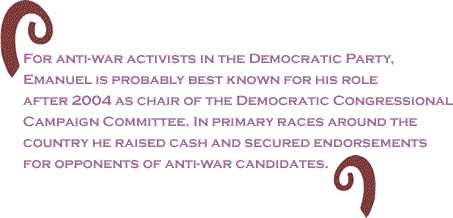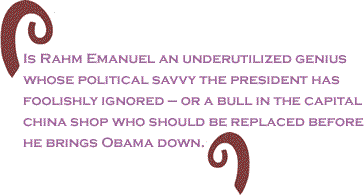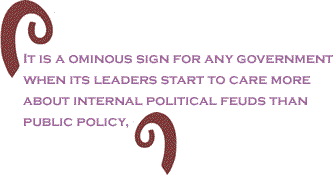
|
||||||||||||||||||||||
|
||
 |
||
The editors at the Financial Times have taken to referring to it as �palace intrigue.� Which seems a little overblown to me, evoking images of damsels locked in drafty bell towers, eunuchs tiptoeing down dank halls in the middle of the night and courtiers slyly whispering into the monarch�s ear. I doubt anything like that is going on in the White House these days. But whatever is going on is getting lots of press. �It is a ominous sign for any government when its leaders start to care more about internal political feuds than public policy,� the paper said editorially March 11. �Barack Obama�s White House has seemed to come down with a serious case of palace intrigue syndrome, as various groups seek to apportion blame for what is becoming to be known as �Obama�s wasted year�.� Rejecting the notion that the year has really been wasted, the paper went on to note that the President�s Chief of Staff Rahm Emanuel has become the center of attention with some critics saying he caused the Administration to overreach in pressing its agenda. �Recently,� it noted, �Mr. Emanuel�s allies have pushed back� by suggesting that actually it was President who overreached - against Emanuel�s more cautious advice. New York Times columnist Frank Rich wrote March 7, �Washington Post columnists are now dueling whether Rahm Emanuel is an underutilized genius whose political savvy the president has foolishly ignored � or a bull in the capital china shop who should be replaced before he brings Obama down.� The friends of Rahm have certainly been busy as bees with obviously planted stories and opinion pieces in the country�s major newspapers. A lot of these pundits quote one another but curiously I found no mention of a column by Colbert King that appeared way back on February 27 in the Post. �President Obama can't say he wasn't warned,� King wrote in a column titled, �What President Obama should have realized about Rahm Emanuel.� �Eighteen months ago, I warned then-presidential candidate Barack Obama that should he get elected, he should not allow his administration to fall into the clutches of Washington insiders,� King went on �The caution sign was raised based on years of observing this town's political movers and shakers at work.� King says he warned Obama of a �danger in relying on these power brokers, be they Democrats or Republicans. They may join a new administration and set out to work for its success. But let the new president hit a rough patch -- as all chief executives do -- and some Washington insiders will go to ground in a heartbeat.
�That's because the last thing Washington insiders want is association with anything resembling a bumbling failure. Their immediate concern is to salvage their reputations and maintain their A-list standing in this ever-so-status-conscious town. �One way they cover themselves when things go off the rails is to begin lamenting to friends and -- directly or through friends -- to journalists about how the new and �na�ve� president is failing to heed their wise counsel.� King went on to list some of the issues around which Emanuel allegedly urged caution and Obama ignored his advice, like promising to close Guantanamo or trying a 911 suspect in a civilian court. Supposedly, Emanuel �argued for a smaller, more politically popular health-care bill, but Obama disregarded that strategy� and it is implied that the President�s trip to China was not productive as it could have been because Emanuel was missing from his entourage, King wrote. Actually, a second reading of these allegations suggests something else. I would venture to say that the people at the Financial Times got it wrong. When you come right down to it, these �internal political feuds� are really about �public policy.� King could have cautioned Obama, who got elected largely because he opposed the war in Iraq, that there might be problems giving so much power to Emanuel who supported the invasion and occupation. Observers were so enamored with the idea of Obama putting together a �team of rivals� that they failed to note that Emanuel�s views on the conflict in the Middle East are quite contrary to Obama�s Cairo speech about reaching out to the Islamic world. Overlooked was the fact that the President, so broadly supported by people working to end the war in Iraq, was placing at his right hand someone who had worked quite hard to undercut peace sentiment inside the Democratic Party. �Is Obama Screwing His Base with Rahm Emanuel Selection?� Stephen Zunes asked the day after the November election. The newly named chief of staff �is a member of the so-called New Democrat Coalition (NDC), of group of center-right pro-business Congressional Democrats affiliated with the Democratic Leadership Conference, which is dedicated to moving the Democratic Party away from its more liberal and progressive base,� he wrote in AlterNet. �Numbering only 58 members out of 236 Democrats in the current House of Representatives, the DC has worked closely with its Republican colleagues in pushing through and passing such legislation as those providing President Bush with 'fast-track' trade authority in order to bypass efforts by labor, environmentalists and other public interest groups to promote fairer trade policy.�
Zunes added, �Emanuel was the single most important official involved in pushing through the North American Free Trade Agreement (NAFTA), the bill ending Aid for Families with Dependent Children (AFDC), and Clinton's draconian crime bill, among other legislation.� For anti-war activists in the Democratic Party, Emanuel is probably best known for his role after 2004 as chair of the Democratic Congressional Campaign Committee. In primary races around the country he raised cash and secured endorsements for opponents of anti-war candidates. The Obama administration is fast approaching a critical turning point. The issue of healthcare reform is going to be resolved � at least for this session of Congress � soon and the Oval Office will have turn its attention to other items on the legislative agenda such as immigration and labor law reform. Activists involved with such issues are quite aware that, in addition to the recalcitrant Republicans intent on nothing less than stymieing Obama, there are also conflicts within the Administration. How they are resolved are far more important than any pretentions or career expectations of individual staff members. Last Sunday, the New York Times magazine carried a fairly sympathetic portrayal of Emanuel�s travails by the paper�s White House correspondent Peter Baker. The article portrayed him as a loyalist that dutifully carries out Obama�s policies and made the valid point that the President makes the decisions not his advisors. It also contained this paragraph: �He has also been at odds with minority caucuses within the Democratic fold in the House. Members of the Congressional Black Caucus and Congressional Hispanic Caucus say he does not pay attention to their issues. Hispanic lawmakers blame him for a provision inserted into the Senate health care legislation that would bar illegal immigrants from buying policies on new insurance exchanges even with their own money, and they complain that he is not putting any energy behind liberalizing immigration laws. �There are strong feelings about Rahm Emanuel among members of the Hispanic caucus,� Representative Nydia Valaquez of New York, the head of the caucus, told me. �People feel Rahm Emanuel has not been helpful in moving forward. He�s always about the numbers. He�s always about being the pragmatist. He�s always about winning�.� "There is a palpable, grassroots anger that is going to go national if there is not a breakthrough soon," Frank Sherry, the founder of America's Voices, a group that advocates immigration reform, recently told Politics Daily. "If there's not, I think the effort to pass legislation will become akin to a social movement to raise the moral stakes of 11 million people living in the country with no meaningful rights." �Other Latino leaders and immigration advocates say they understood that the president had to deal first with the economic crisis that confronted him when he came into office, and even that he chose to address health care reform as his next domestic priority,� said the paper, adding that in interviews �several said they believe that some Democrats are slow-walking reform to avoid dealing with the politically hot-button issue." "I think there's a bit of this Rahm Emanuel kind of mentality, where they think that immigration reform is a liability for Democrats who would rather not take a tough vote," Brent Wilkes, executive director of League of United Latin American Citizens (LULAC) told Politics Daily. "They think that as long as they think they can keep the immigrant community mollified, they can just put it off without delivering on that promise."
"The message to Democrats is that they need to deliver in order to have a shot at maintaining support from the Latino community," said Clarissa Martinez, director of immigration and national campaigns National Council of La Raza. "Addressing reform is essential for Republicans as well if they have any interest in repairing their relationship with the fastest growing portion of the American electorate." Coincidently, the author of one major piece of proposed immigration legislation before the House of Representatives warned last week that the current healthcare bill's immigration provisions are enough to spur Hispanic members of Congress to vote against it. Rep. Luis Gutierrez (D-Ill.) a member of the Congressional Hispanic Caucus (CHC) and chair of its Immigration Task Force, said the caucus still has concerns over the extent to which the healthcare bill excludes illegal immigrants as well as legal residents from receiving benefits in the healthcare plan. "They are enough to say I can't support this bill," Gutierrez told MSNBC.
I seriously doubt that tales of intrigue on Pennsylvania Avenue are going to go away any time soon. The important thing to keep in mind is that it�s as much about substance as it is about style, about content as well as form, about policies, not personalities. BlackCommentator.com Editorial Board member Carl Bloice is a writer in San Francisco, a member of the National Coordinating Committee of the Committees of Correspondence for Democracy and Socialism and formerly worked for a healthcare union. Click here to contact Mr. Bloice. |
||
If you would like to comment on this article, please do so below. There is a 400 character limit. You do not need a FaceBook account. Your comment will be posted here on BC instantly. Thanks. Entering your email address is not mandatory. You may also choose to enter only your first name and your location.
|
||
Thank you very much for your readership. |
||
| Any BlackCommentator.com article may be re-printed so long as it is re-printed in its entirety and full credit given to the author and www.BlackCommentator.com. If the re-print is on the Internet we additionally request a link back to the original piece on our Website. | ||
| |
||
March 18, 2010 |
| Executive Editor: David A. Love, JD |
| Managing Editor: Nancy Littlefield |
| Publisher: Peter Gamble |
| Est. April 5, 2002 |
| Printer Friendly Version in resizeable plain text format |
 |
 |
 |

|
 |
| |
| |



















































